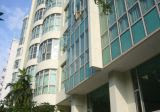
IT’S not easy running a multi-billion dollar business. Such an accomplishment is more impressive when you consider that the person doing it is a young man who not that long ago struggled to pay his tuition fees and living expenses.
The company is Phison Electronics Corp, a listed technology company in Taiwan with a market capitalisation of almost NT$40bil (RM4.3bil). Its main claim to fame is that it changed how many personal computer users store and transfer data.
According to Phison’s website, in 2001, the company came up with a product that led to the demise of the floppy disk. It was the world’s first USB (universal serial bus) “flash removable disk”. Most of us know it simply as a pen drive. In fact, that was what Phison named the product.
(USB flash removable disks are also known as thumb drives, yet another trademark that has evolved into a generic term.)
Phison’s president and co-founder is Pua Khein-Seng, an energetic 35-year-old whose childhood memories include fishing trips and living in a place surrounded by paddy fields. After all, he grew up in the pretty village of Sekinchan, Selangor.
Yes, the man behind the pen drive is a Malaysian. Although he has been living in Taiwan for the past 16 years, Pua still considers Malaysia as his home.
His success story began in 1993, when he arrived in Taiwan to study electrical control engineering at the National Chiao Tung University. During his three years there, he worked part time, earning about NT$80 per hour (RM8), to help pay his way.
“My intention was to come back to Malaysia after graduating,” he says, adding that he had already given up his ambition to get a master’s degree because it cost too much to prepare for a qualifying examination.
Then, in his third year at the university, the rules changed. Students need not sit for the exam to gain entry into a master’s programme if they do very well for their first degreee. Pua not only obtained first class honours but was also top in his faculty. He thus kept his dream alive.
Phison takes off
After Pua obtained his master’s degree, a professor at the university offered him a salary of NT$5,000 per month to research and develop memory controllers. The professor set up a company with his friends, and Pua became an employee.
As a key engineer in the company, he travelled to places like South Korea and Japan for meetings. It was a time to gain valuable experience and exposure. That ended when friction and office politics nudged Pua into a decision to leave. However, complications over his work permit blocked his exit and forced a long negotiation.
Eventually, the shareholders promised to invest NT$30mil in a spin-off company where Pua would have a lead role alongside some friends. But things did not go as planned. The shareholders only invested NT$1mil and later opted to give up.
“We faced some problems that time as we had purchased equipment, and the resources were ready,” Pua recalls.
Clinging to the principle of never backing down in the face of adversity, Pua and his friends chose to forge ahead with the new venture. But first, they needed fresh capital.
The target was NT$6mil which they hoped to achieve through borrowings and their own savings. At that time, venture capitalists were not exactly in a hurry to put money in the fledgeling business. Through his contacts, Pua finally secured some investments to get the business running. With that, Phison got off the ground.
According to Pua, the company was not producing USB drives when it began operating in 2000. Instead, it was making USB card readers. In fact, Phison also claims to make the world’s first 5-in-1card reader.
In January 2001, an Australian customer approached the company on the possibility of producing a USB drive. This put Phison on the path to its rapid rise.
“There was already a USB drive but we invented the USB drive SoC (system on chip), which uses a single chip,” Pua explains. He was only 27 at that time.
Despite this milestone, the company still had to grapple with teething problems. It was tough, for example, for a start-up with limited funds to attract talent. “We tried to hire Malaysians who had just graduated in Taiwan but it was hard to obtain work permits,” he says.
The company’s stature and appeal have since grown following its listing on the Taiwan Stock Exchange in 2004. It now has 430 employees, of whom 210 are engineers. Its principal activity is designing USB flash controllers and related NAND (a type of technology for flash memory) flash applications. It also designs integrated circuits and provides system integration services.
Its products include controller ICs (integrated circuits) for card readers, pen drives, memory cards, flash disks, and other electronic devices.
These are exported worldwide.
Its revenue has ballooned from US$500,000 in the first year of operation to US$580mil last year. It spends between US$15mil and US$20mil annually on research and development. Clearly, Phison has overcome the rocky start.
What is it that motivates Pua in dealing with huge obstacles? “My passion has helped me overcome the hurdles and also, there is the desire to prove that we are right. It’s thanks to the support from my staff, partners and shareholders,” he says.
His maxim in life is to do things correctly everyday and to be patient so as to grow better. “I just want to raise my quality of life and be myself,” he adds.
To grow further, you have to keep improving yourself, he says. “We are our own worst enemy. We have to be patient and concentrate on the things we are doing.”
For those who want to go into business at a young age, he urges them to consider carefully such a move because setting up a business is not easy without working experience. “You need a team as it is not a one-man show. You need to have your core technology and values to stay competitive,” he adds.
Leadership management and creating a good environment are essential in the development of a company. So how does Pua treat his staff members?
They are like his family, he says. “We have to do the right thing for our staff and they will do the right thing for you.”
Local pride
To him, it is a simple principle: “Don’t treat others the way you wouldn’t want others to treat you. Your staff will like you more if you treat them like your friends. They will not like to work for you if you treat them as part of a money-making machine.”
This has been tested during the global financial crisis, when millions of people have lost their jobs. Although Phison’s revenue decreased from US$630mil in 2007 to US$580mil last year due to the downturn, Pua does not believe in retrenchment and insists that the company’s best assets are its employees.
“We didn’t implement a retrenchment programme. In fact, we increased salaries and paid bonuses,” he says. He points out that although last year’s net profit dipped, it was a nevertheless a good sign that it was possible to register a profit even in these hard times. Thus, rewarding the staff was necessary.
Pua says his priorities in running a business are the staff, followed by suppliers, shareholders and customers. “I promise to share the company’s profits with my employees,” he maintains.
After being away from Malaysia so long, how does Pua feel about his homeland? “I’m like a foreigner in Malaysia but I like the place very much. I’m not really familiar with it now but I really miss the food here. This is my country and I keep track on the news in Malaysia,” he says.
He describes Malaysia as his motherland and Taiwan as his second home. “I am proud to be Malaysian, ” he adds.
He comes back to Malaysia once in three to four months as his parents are staying here.
“The quality of life is good in Malaysia as the pace is not so fast. This is a nice place to relax and enjoy, as there are mountains and the seaside. I will come back for my retirement.”
Fact File
Born: Malaysia (June 15, 1974)
Personal: Married with three kids
Education: Master's in Electrical Control Engineering
Career: President of Phison Electronics Corp (Taiwan)
Favourite food: Curry rice, Noodles, Hokkien Mee
Favourite place: Malaysia
Hobbies: Golf, Swimming, Sleeping
Values: To judge other people's feelings by one's own and to treat others with sincerity.











